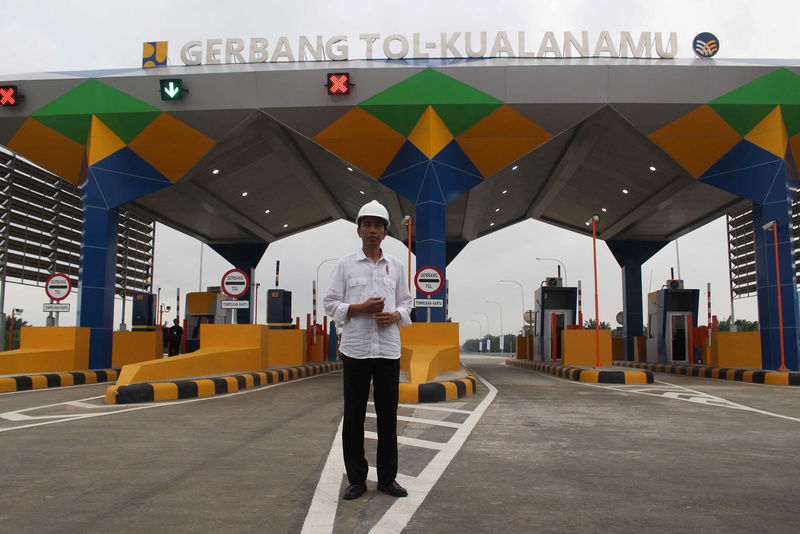By Hidayat Setiaji and Gayatri Suroyo
JAKARTA (Reuters) - Soon after Indonesian President Joko Widodo took office in 2014, he ordered his ministers to give private companies first pick of profitable infrastructure projects, until then usually grabbed by state-owned enterprises (SOEs).
Three years on, the private sector is estimated to be handling only one in five projects, sparking warnings that the dominance of SOEs is holding back billions of dollars of extra investment that could help fix shoddy infrastructure.
Now, even government insiders are questioning the status quo. Finance Minister Sri Mulyani Indrawati told a World Bank forum this month there was a need to assess whether SOEs were "really efficient in investing in infrastructure."
"We will look at what kind of dominance, what kind of behavior that is creating the crowding out of the private sector," Indrawati said.
A failure to get private firms to shoulder a bigger burden is another risk for Southeast Asia's biggest economy at a time when consumption is sluggish and interest rates have been cut twice in quick succession to spur flatlining growth.
Over 2,600 km of new roads and seven new airports have been built since Widodo took power in October 2014 - near the midpoint of targets for his full tenure, government data shows.Despite missing targets in power, rail, water and housing, an independent survey by the Center for Strategic and International Studies showed that Indonesians were optimistic their president would improve infrastructure.
Over-stretched SOEs could be pushed to do yet more.
Four Indonesian state firms are preparing to issue the country's first rupiah-denominated global bonds, which Widodo has dubbed “komodo bonds”, to raise funds for infrastructure projects. Komodo dragons are giant lizards found only in eastern Indonesia.
SHARE OF THE PIE
Johannes Suriadjaja, chief executive of private construction firm Surya Semesta Internusa (JK:SSIA), said his company tried to win infrastructure work for years without much success.
"It's difficult because everything is too concentrated at the government or the SOEs," Suriadjaja said. State groups were prepared to take tenders he could not justify because of low profitability, he said.
Rainier Haryanto, program director of the government's Committee to Accelerate Priority Infrastructure, disputed this.
"We do things through open tender and the one offering the best price wins. If the private players are not competitive and they don't win. Don't blame the government and SOEs," he said.
Three years ago, at the start of his five-year term, Widodo outlined a need for $450 billion investment in infrastructure by 2019. He anticipated 37 percent would come from private companies, up from only 9 percent on average in 2011-2015.
He wanted SOEs' share of investment financing to be reduced to 22 percent, from 33 percent in 2011-2015, with the remainder coming from central and regional government budgets.
He's nowhere near that target. Andi Rukman Karumpa, secretary general of the National Construction Services Association, estimated 80 percent of public projects are still handled by SOEs, using their own funding or the state budget.
SUBWAY, AIRPORT LINK TAKE SHAPE
World Bank President Jim Yong Kim said in July SOEs had an advantage with government backing and in navigating red tape. But "for Indonesia to continue to have a thriving economy, you need to actively encourage private sector involvement".
The World Bank in its October economic review said Indonesia needed to spend $1.5 trillion to catch up with other comparable emerging economies. Even if it invested at the rate promised, it would take 20 years to match the average infrastructure stock of emerging markets, the Bank said.
The government allocated around $72 billion in infrastructure-related spending up to 2017, including capital injections to SOEs, and wants parliament to approve $30 billion more next year.
Although Indonesia has won funding from multinational lenders such as the World Bank, as well as China and Japan, the projects mostly went to SOEs. They include a $4.5 billion Jakarta to Bandung high-speed rail link funded by China Development Bank, which will be built by a consortium of Chinese and local SOEs.
Karumpa at the construction association wants the government to double the minimum project size project that SOEs can take to 100 billion rupiah ($7.38 million), so private firms can at least take over smaller publicly funded projects.
For most Indonesians, just getting basic infrastructure, whoever builds it, is what matters.
After a string of delays, traffic-clogged Jakarta is due to finally have a mass rapid transit system, the first for the G20 nation, in 2019 and a rail link to the city's airport is set to launch next year.
Japanese companies, including Obayashi Corp (T:1802), are working with state-run builder Wijaya Karya (JK:WIKA) and private PT Jaya Konstruksi Manggala Pratama (JK:JKON) on the MRT.
The airport railway is being built by two SOEs, PT Kereta Api Indonesia and PT Angkasa Pura II.
